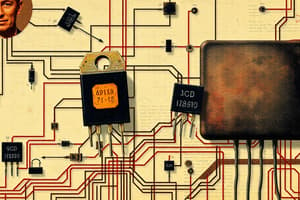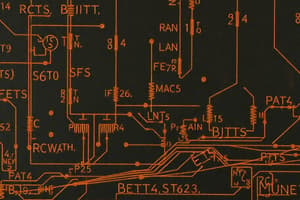Podcast
Questions and Answers
What year were transistors first invented?
What year were transistors first invented?
- 1927
- 1947 (correct)
- 1957
- 1937
What was the primary purpose of transistors when they were first developed?
What was the primary purpose of transistors when they were first developed?
- To reduce the size and power consumption of electronic devices (correct)
- To replace capacitors in electronic circuits
- To increase the processing speed of computers
- To improve the performance of vacuum tubes
Who invented the integrated circuit, which combined multiple transistors onto a single chip?
Who invented the integrated circuit, which combined multiple transistors onto a single chip?
- John Bardeen
- Walter Brattain
- Robert Noyce (correct)
- William Shockley
What are the different types of transistors that have been developed over time?
What are the different types of transistors that have been developed over time?
What is the main focus of current research on transistors?
What is the main focus of current research on transistors?
What was the primary active component in electronic circuits before the invention of transistors?
What was the primary active component in electronic circuits before the invention of transistors?
What type of transistor technology is mentioned as a recent development in the passage?
What type of transistor technology is mentioned as a recent development in the passage?
How do the GaN-based HEMTs compare to traditional silicon-based transistors according to the passage?
How do the GaN-based HEMTs compare to traditional silicon-based transistors according to the passage?
What other emerging technologies are researchers exploring according to the passage?
What other emerging technologies are researchers exploring according to the passage?
What role have transistors played in the development of modern electronics according to the passage?
What role have transistors played in the development of modern electronics according to the passage?
What does the passage suggest about the future of transistors and their role in technology?
What does the passage suggest about the future of transistors and their role in technology?
Flashcards are hidden until you start studying
Study Notes
Transistor History
Transistors have been a crucial component of electronic devices since their invention in 1947 by William Shockley, John Bardeen, and Walter Brattain at Bell Laboratories. They replaced vacuum tubes as the primary active components of most electronic circuits, leading to smaller, more reliable, and energy-efficient electronics.
Early Developments
In the early days of transistor history, researchers focused on developing improved transistor designs and technologies. One significant milestone occurred when Robert Noyce invented the integrated circuit, which combined multiple transistors onto a single chip. This innovation revolutionized the semiconductor industry and paved the way for the development of microprocessors and personal computers.
Development Milestones
Over time, various types of transistors were developed, including bipolar junction transistors (BJT), metal-oxide-semiconductor field-effect transistors (MOSFET), and heterojunction bipolar transistors (HBT). These different types provided unique advantages, such as higher power handling, lower power consumption, and better performance.
Modern Advances
As of today, transistors continue to evolve, with researchers working on improving their efficiency, miniaturization, and integration into complex systems. For instance, some recent developments in transistor technology include the creation of high-electron mobility transistors (HEMTs) based on gallium nitride (GaN) material systems, which offer increased speed and reduced power consumption compared to traditional silicon-based transistors. Additionally, researchers are exploring emerging technologies like organic semiconductors and spintronics, which could lead to novel applications and enhancements in existing electronic devices.
Conclusion
From their inception to the present day, transistors have played a vital role in shaping modern electronics. Their ongoing evolution and advancements reflect our growing understanding of semiconductor physics and material science, ultimately driving progress in areas ranging from telecommunications to computing and beyond. As we continue to innovate and push the boundaries of what is possible, transistors will undoubtedly remain central to the ever-evolving landscape of technology.
Studying That Suits You
Use AI to generate personalized quizzes and flashcards to suit your learning preferences.




